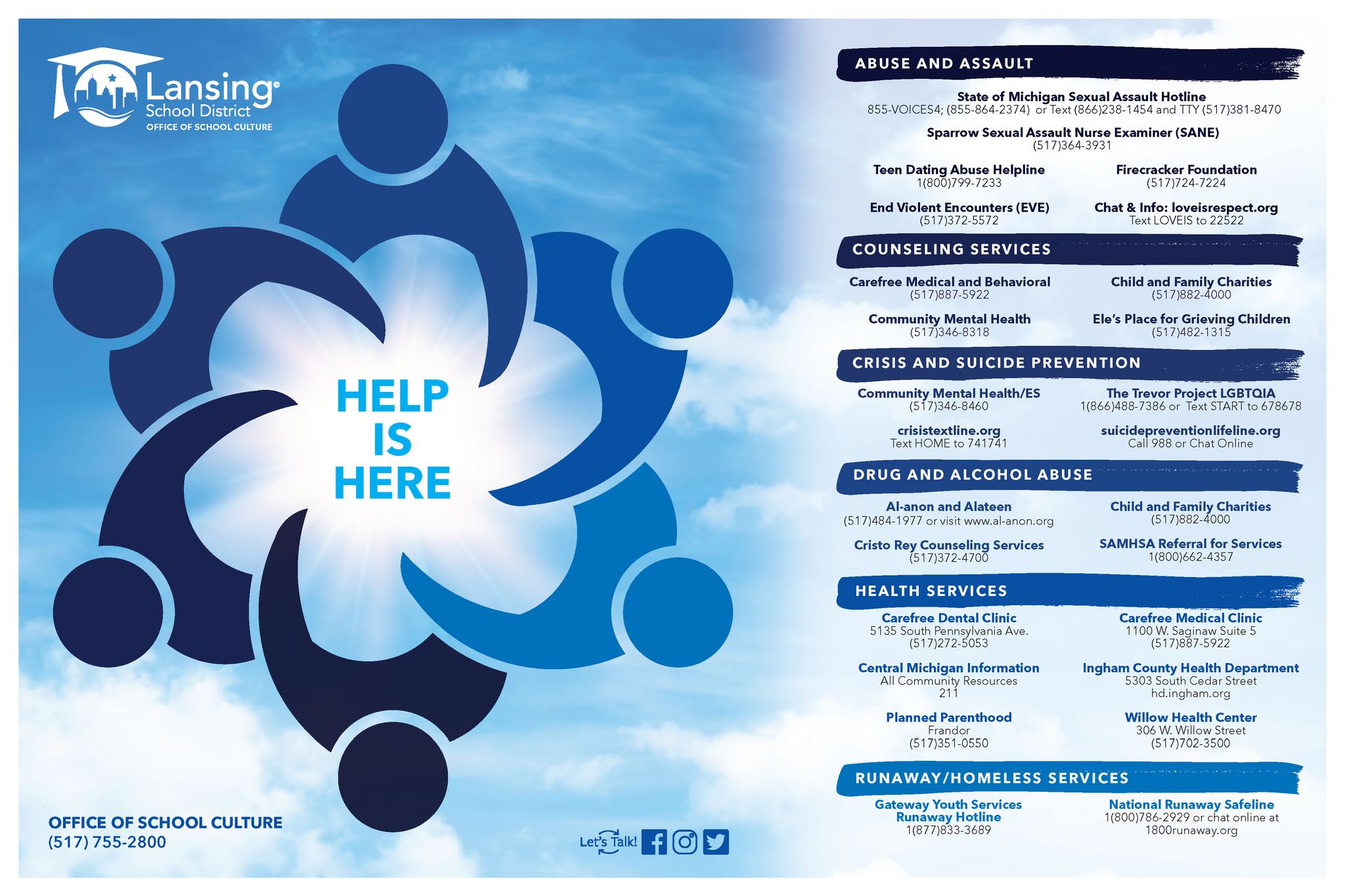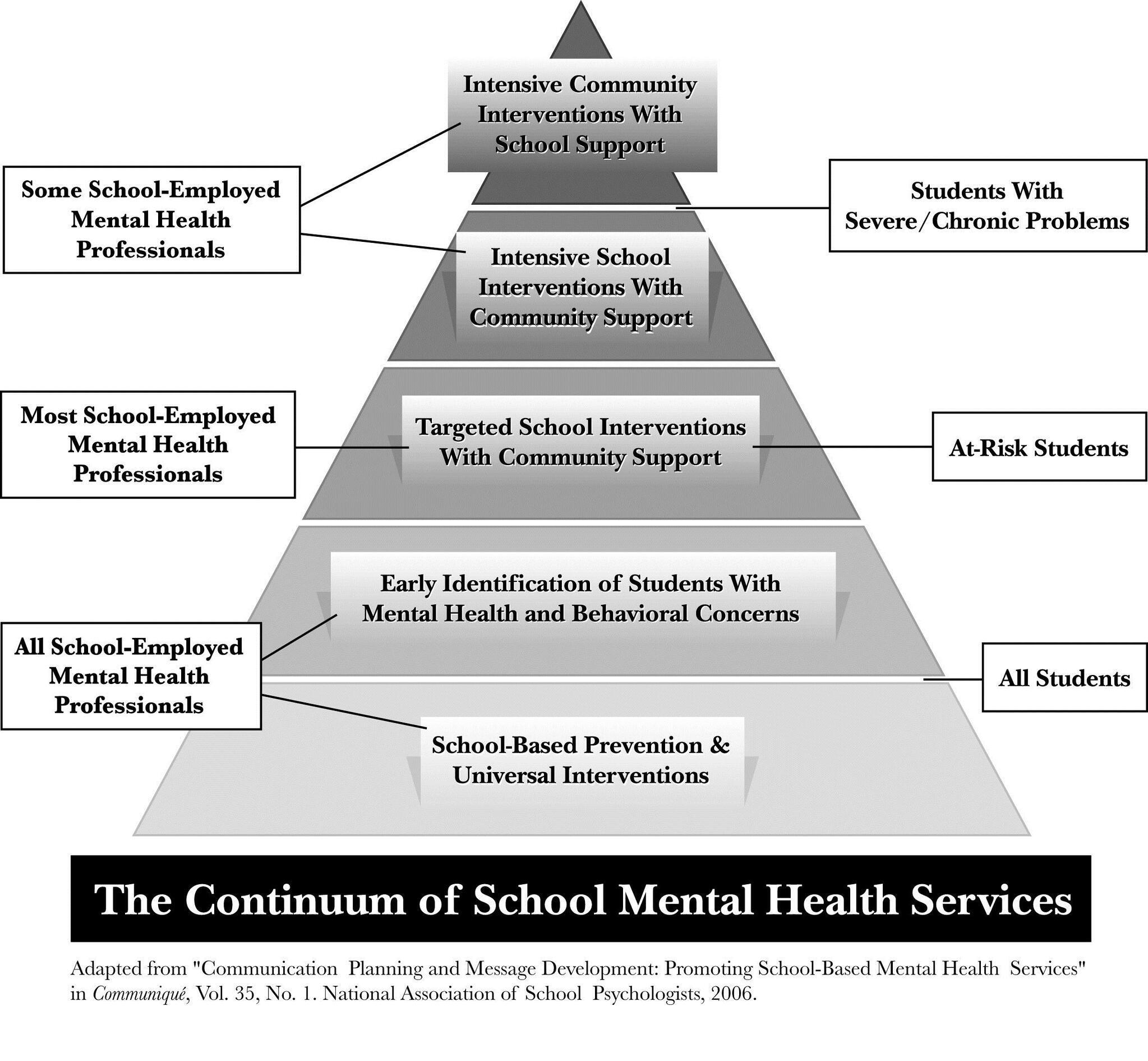Mental Health
Meet the Staff
Director of Mental Health Services
Christina RiosChristina.Rios@lansingschools.net |
|
Mental Health Clinicians |
|
Cha'Quan Love, MA, LLPC Chaquan.Love@lansingschools.net
|
Aisleen Morr, LLMSW Aisleen.Morr@lansingschools.net
|
|
Jessica Troncoso, LMSWJessica.Troncoso@lansingschools.netWexford & Mt. Hope |
ABUSE AND ASSAULT
State of Michigan Sexual Assault Hotline
855-VOICES4; (855-864-2374) or Text (866)238-1454 and TTY (517)381-8470
Sparrow Sexual Assault Nurse Examiner (SANE)
(517)364-3641
End Violent Encounters (EVE)
(517)372-5572
The Firecracker Foundation
517-742-7224
Chat & Info: www.loveisrespect.org
Text LOVEIS to 22522
Teen Dating Abuse Hotline
1(800)799-7233
COUNSELING SERVICES
Carefree Medical and Behavioral
(517)887-5922
Community Mental Health
(517)346-8318
Child and Family Charities
(517)882-4000
Ele’s Place for Grieving Children
(517)482-1315
CRISIS AND SUICIDE PREVENTION
Community Mental Health/Emergency Services
(517)346-8460
www.crisistextline.org
Text HOME to 741741
The Trevor Project LGBTQIA
1(866)488-7386 or Text START to 678678
www.suicidepreventionlifeline.org
Call 988 or Chat Online
DRUG AND ALCOHOL ABUSE
Al-anon and Alateen
(517)484-1977 or visit www.al-anon.org
Cristo Rey Counseling Services
(517)372-4700
Child and Family Charities
(517)882-4000
SAMHSA Referral for Services
1(800)662-4357
HEALTH SERVICES
Carefree Dental Clinic
5135 South Pennsylvania Ave.
(517)272-5053
Carefree Medical Clinic
1100 W. Saginaw Suite 5
(517)887-5922
Central Michigan Information
All Community Resources
211
Ingham County Health Department
5303 South Cedar Street
https://hd.ingham.org/
Planned Parenthood
Frandor
(517)351-0550
Willow Health Center
306 W. Willow Street
(517)702-3500
RUNAWAY/HOMELESS SERVICES
Gateway Youth Services
1(877)833-3689
National Runaway Safeline
1(800)786-2929 or chat online at
1800runaway.org

About Mental Health
Mentally healthy children are more successful in school and life. Good mental health is critical to children’s success in school and life. Research demonstrates that students who receive social–emotional and mental health support achieve better academically. School climate, classroom behavior, on-task learning, and students’ sense of connectedness and well-being all improve as well. Mental health is not simply the absence of mental illness but also encompasses social, emotional, and behavioral health and the ability to cope with life’s challenges. Left unmet, mental health problems are linked to costly negative outcomes such as academic and behavior problems, dropping out, and delinquency.
There is a growing and unmet need for mental health services for children and youth. According the U.S. Department of Health and Human Services, one in five children and adolescents experience a mental health problem during their school years. Examples include stress, anxiety, bullying, family problems, depression, a learning disability, and alcohol and substance abuse. Serious mental health problems, such as self-injurious behaviors and suicide, are on the rise, particularly among youth. Unfortunately, estimates of up to 60% of students do not receive the treatment they need due to stigma and lack of access to services. Of those who do get help, nearly two thirds do so only in school.
Schools are an ideal place to provide mental health services to children and youth. Virtually every community has a school and most children spend at least 6 hours a day there. Schools offer an ideal context for prevention, intervention, positive development, and regular communication between school and families. School-employed professionals like school psychologists, school counselors, school social workers, and school nurses know the students, parents, and other staff, which contributes to accessibility of services. In fact, research has shown that students are more likely to seek counseling when services are available in schools. In some cases, such as rural areas, schools provide the only mental health services in the community.
School mental health services support the mission and purpose of schools: learning. All services provided in schools should be appropriate to the learning environment; those that are not risk being ineffective or even counterproductive. Just as children are not simply small adults, schools are not merely private clinics with chalk boards. Being trained to work within this culture is essential to being effective (and cost-effective).
School-employed mental health professionals are specially trained to provide services in the learning context. School counselors, school psychologists and school social-workers provide the vast majority of school-based services. They are specially trained in school system functioning and learning, as well as how students’ behavior and mental health impacts their ability to be successful in school. Areas of expertise include but are not limited to: education law, curriculum and instruction, classroom and behavior management, individual and group counseling, learning disabilities, school safety and crisis response, effective discipline, cultural competence, and consultation with educators, families and community providers.
School mental health services are essential to creating and sustaining safe schools. Increased access to mental health services and supports in schools is vital to improving the physical and psychological safety of our students and schools, as well as academic performance and problem-solving skills. School mental health supports that encompass social–emotional learning, mental wellness, resilience, and positive connections between students and adults are essential to creating a school culture in which students feel safe and empowered to report safety concerns, which is proven to be among the most effective school safety strategies. Additionally, in the aftermath of a crisis, school-employed mental health professionals provide supports that facilitate a return to normalcy, are sustainable, and can help to identify and work with students with more intense or ongoing needs.
Providing a continuum of school mental health services is critical to effectively addressing the breadth of students’ needs. Comprehensive mental health services are most effective when provided through a multitiered system of supports (MTSS) but school-employed mental health professionals. MTSS encompasses the continuum of need, enabling schools to promote mental wellness for all students, identify and address problems before they escalate or become chronic, and provide increasingly intensive, data-driven services for individual students as needed. Access to adequate staffing of school-employed mental health professionals is essential to the quality and effectiveness of these services.
School-community collaboration is critical to providing the full continuum of mental health services. Meeting the full continuum of student needs is also dependent on collaboration between schools and community mental health providers. Typically, community providers offer supplementary or intensive services that go beyond school capacities. An MTSS approach facilitates effective collaboration while ensuring that services provided in school are appropriate to the learning context and those that are provided after school hours are appropriately linked to and supported in the school setting. Partnerships are most effective when coordinated by school-employed mental professionals, are defined by clear memoranda of understanding, and reinforce an appreciation for the unique contribution each group makes to creating more seamless and comprehensive service delivery. This not only reduces gaps, redundancy, and conflict, it also reduces stress on families and supports their roles as primary caregivers and decision-makers regarding their child’s development.

©2016, National Association of School Psychologists, 4340 East West Hwy. #402; Bethesda, MD 20814, www.nasponline.org, phone (301) 657-0270, fax (301) 657-0275, TTY (301) 657-4155


